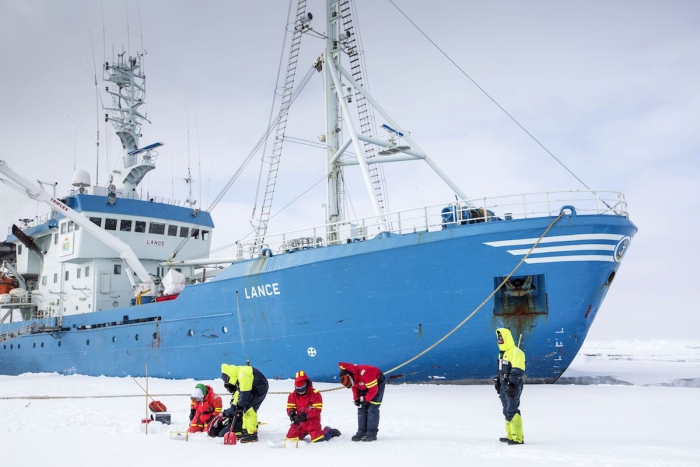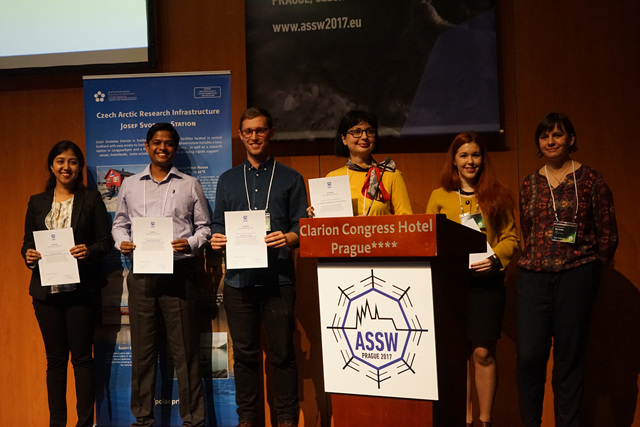By: Gunnar Gunnarsson, International Arctic Science Executive Officer and Allen Pope, International Arctic Science Committee Executive Secretary
The Arctic is a huge natural laboratory offering a surprising diversity of research possibilities in every branch of science. The International Arctic Science Committee's (IASC) mission is to encourage and facilitate cooperation in all aspects of Arctic research, in all countries engaged in Arctic research, and all areas of the Arctic region. For nearly three decades, IASC has worked to transform the conditions for cooperation in Arctic science by planning and supporting major multinational research initiatives; by organizing the Arctic Science Summit Week (ASSW) and other meetings each year; and convening and empowering international scientific working groups.

Working Across Disciplines
IASC's main scientific working bodies are the five Working Groups: Atmosphere (AWG), Cryosphere (CWG), Marine (MWG), Social & Human (SHWG), and Terrestrial Sciences (TWG). While the IASC Working Groups are set up along disciplinary lines, they have dedicated resources to support interdisciplinary projects proposed by Arctic scientists from IASC member countries. In this way, IASC is committed to fostering interdisciplinary activities, in particular across the natural and social sciences and humanities. Last April, the Social and Human Working Group launched a new crosscutting thematic activity, the "Long-Term Perspectives on Arctic Social Ecological Systems (SESs)." This SESs activity promotes an interdisciplinary approach to understanding past human responses to changing Arctic environments and, in turn, strengthens the knowledge base for future sustainability strategies. The first session focused on the paleo aspects of Arctic SESs by integrating historical, archaeological, and long-term environmental and climate records. In coming years, the SHWG will develop further initiatives to examine contemporary and future perspectives.
Enhancing and Extending Polar Partnerships
With the goal to develop and stimulate shared initiatives that are of high interest to the broader Arctic research community, IASC maintains close partnerships with several other Arctic and Polar organizations. The recent "Arctic Vegetation Archive and Classification" workshop—jointly organized by the Terrestrial Working Group and the Arctic Council's CAFF Flora Group—is an illustrative example. The primary goal of the workshop was to develop an Arctic terrestrial monitoring program and provide a standardized vegetation framework and data enabling each country to assemble its own archive. By developing common protocols, the databases can later be united into a single circum-Arctic Vegetation Archive.
Building Capacity of Early Career Researchers
IASC recognizes that the next generation of Arctic researchers will be faced with increasingly critical Arctic and global challenges. The Committee, therefore, works to support international and interdisciplinary experiences for early career researchers. This year, the Marine Working Group supported five early career scientists to participate in the Ecosystem Studies of Sub-Arctic Seas (ESSAS) Open Science Meeting in Norway. Here the young researchers got the opportunity, as speakers or co-conveners, to share their research with scientists from around the North.
The Working Groups not only provide travel support for young researchers, they also integrate the IASC Fellowship Program with their activities. A call for applications is released each year in October through the IASC and APECS mailing lists, websites, and Facebook.

Upcoming Activities
IASC continues to support the Multidisciplinary drifting Observatory for the Study of Arctic Climate (MOSAiC), scheduled to start in autumn 2019. MOSAiC was born out of the Atmosphere Working Group and will be the first year-round expedition into the central Arctic exploring the Arctic climate system. MOSAiC's overall goal is to understand more thoroughly how the coupled Arctic climate system functions, in particular under rapid Arctic climate change that will not only affect the local Arctic climate but might also be affecting hemispheric circulation patterns and global change. Visit the project's IASC website for more information. IASC is excited to support and foster MOSAiC and aims to incubate other such transformative Arctic science activities.
In addition to broad changes in Arctic snow and sea-ice coverage, climate change is expected to affect the occurrence and intensity of cryospheric extremes such as heavy snowfall, icing, avalanches, and the thawing season of permafrost; and sea-ice motion, compression, and ridging. Although extreme events are a core climate research focus, cryospheric extremes have not yet received much attention. The Cryosphere Working Group is organizing a series of workshops and meetings in 2018 to enhance this research area. One of the meetings is projected to take place at Polar2018, a joint event from the Scientific Committee on Antarctic Research (SCAR) and IASC.
Want to find out more about how to get involved with IASC, find collaborators, or how IASC supports Arctic science? Email the IASC Secretariat (info [at] iasc.info), your national representatives, and/or your Working Group representatives, whose names you will find on the website. To hear more about upcoming IASC activities and opportunities, join the IASC mailing list and Facebook group.
 Gunnar Gunnarsson is the IASC Executive Officer, based in Akureyri, Iceland. His research activities include participation in the Nordic Centre of Excellence ARCPATH (Arctic Climate Predictions - Pathways to Resilient, Sustainable Society).
Gunnar Gunnarsson is the IASC Executive Officer, based in Akureyri, Iceland. His research activities include participation in the Nordic Centre of Excellence ARCPATH (Arctic Climate Predictions - Pathways to Resilient, Sustainable Society). Allen Pope is the IASC Executive Secretary, based in Akureyri, Iceland. A glaciologist and remote sensing scientist, Allen has been with IASC since the beginning of 2017. The IASC Secretariat is generously supported by Rannís, the Icelandic Center for Research.
Allen Pope is the IASC Executive Secretary, based in Akureyri, Iceland. A glaciologist and remote sensing scientist, Allen has been with IASC since the beginning of 2017. The IASC Secretariat is generously supported by Rannís, the Icelandic Center for Research.
